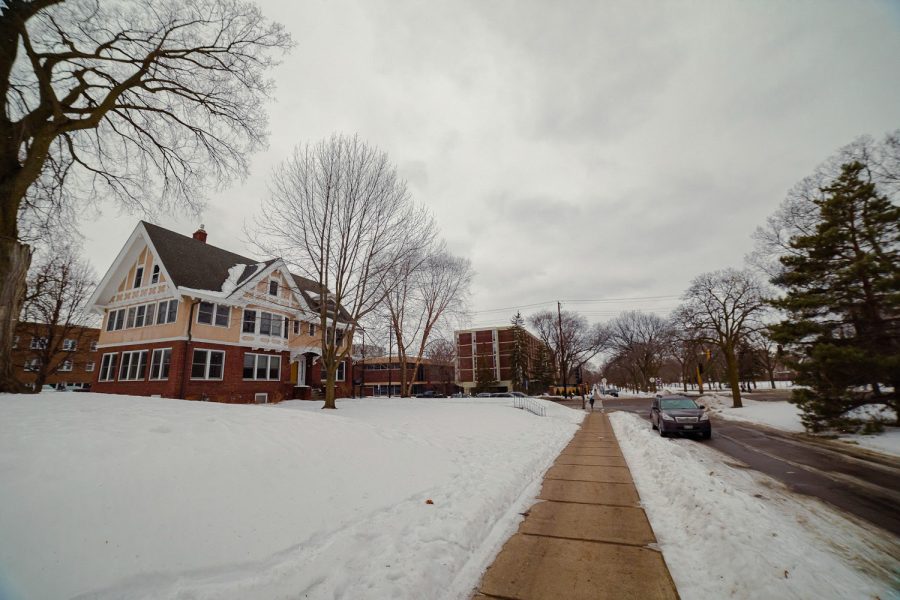Student experiences with COVID-19 isolation housing, heightened COVID-related stress
February 10, 2022
In response to the increased number of COVID-19 cases across Minnesota and the U.S. due to the Omicron variant, the college continues to update their COVID-19 policies and spring semester plans. However, many students have voiced concerns surrounding some of the school’s safety and academic protocols, calling for the administration to do more to meet students’ needs and to promote health and wellness.
Among the numerous issues that students have raised, the college’s current model for on-campus COVID-19 isolation housing is one area in which some feel that the college falls short of providing for its students.
Cassia Hagley ’25 expressed disappointment in her experience with isolation housing, detailing unpleasant conditions including a lack of heat throughout her house, biohazard bags left on the porch, water stains on the walls and dirty sheets. She also mentioned that she had been provided minimal personal items, such as toiletries and household items, upon arrival.
“I understand that it’s really hard to put things in multiple houses, but it just really feels like basic human needs are not being met,” Hagley said.
She also mentioned the disorganization in the meal delivery service, describing few meal options, as well as the COVID Case Management (CCM) Team’s occasional neglect to deliver food.
“They forgot to give my roommate meals for like three days in a row, and they kept giving me stuff that I was not willing to eat, so I told them, ‘please cancel my meal service because I don’t want to waste food,’” Hagley said. “They only brought us food once a day, and we only had one hot meal a day. The rest of it was cold.”
Hagley also spoke about the lack of communication between isolating students and the CCM team, explaining that the CCM team members were often difficult to reach. She elaborated that they left students with many unanswered questions and, as a result, feeling confused.
“They told me that I could reach out to these people, and these are the people who are supposed to be helping us, but they’re not doing anything,” Hagley said.
Sanan Engel ’24 discussed a similar experience in on-campus isolation housing, adding that they felt the college was not sharing isolation protocol information in an accessible manner.
“The problem is that you have to go on the website to find anything,” Engel said. “There are a bunch of email chains [to find out what steps to take].”
Director of COVID Operations Paul Overvoorde and Provost Lisa Anderson-Levy encourage students in isolation to continue sharing feedback with the CCM Team in order to make certain that their needs are met.
Alongside the college’s prioritization of in-person instruction, some students also emphasized an increase in COVID-related stress.
With the surge in the number of COVID-19 cases, students raised concerns surrounding many courses’ emphasis on graded attendance, especially for those experiencing symptoms or in quarantine.
“I’m a little worried for the kids who are in isolation housing right now,” Engel said. “Are they going to do Zoom [classes] for them? Because it’s sort of hard to do Zoom [at the same time as] you’re teaching an in-person class.”
Hagley added that some professors’ strict deadlines and unwillingness to adjust syllabi also placed a weight on students.
“I just turned in a paper that was worth 30% of my grade, and that’s super strict,” Hagley said. “It’s like, ‘you have to turn it in by this time,’ … [but] that might not be fair to some kids.”
Em Aiydarus ’25 also called attention to a decline in students’ mental health with the start of the semester, describing the burnout and anxiety experienced among students.
“I’m here to learn, but compared to the fall term, I feel like with this term, everybody that I associate with or have talked to just seems so sad,” Aiydarus said. “When you have that on top of schoolwork and you have that on top of not being able to be near people that you call home, it’s hard.”
Despite the numerous challenges that students are facing right now, Aiydarus believes that the college as a whole has not met their struggles with enough understanding.
“We’re in such uncertain times that it feels like so much [is happening] so fast,” Aiydarus said. “… I wish that [the administration] would be able to self-reflect for a minute and ask, ‘what if I was a student at this time?’”
Aiydarus said that they also feel that the college is not providing students with sufficient resources to receive the additional support they may need right now, explaining that the linked resources in emails sent to the student body are not helpful enough. More often than not, they believe that students are left to lean on one another for help.
“As students, … we all somehow ended up helping each other out, which I appreciate a lot,” Aiydarus said. “But at the end of the day, it just sucks to have to always be the ones helping each other out when we’re supposed to have people that we’re supposed to look up to.”
In addition to more accessible support resources, students listed many changes that they would like to see implemented in their classes including greater flexibility with deadlines and assignments, as well as asynchronous options. They also feel that their academic stress could be reduced with ungraded or decreased emphasis on participation.
“I know one professor who, in the beginning, said ‘I don’t want this class to be stressful,’” Macalester College Student Government Vice President Jordanella Maluka ’23 said. “I think one thing that’s really been good is that a lot of professors … are having an open conversation about the syllabus — which is not set in stone — and going back and forth with [questions] like, ‘how is this class? Was the reading for this class too much?’”
Maluka, an international student currently studying remotely, felt that her professors have thus far made helpful adjustments to their courses in order to alleviate stress, but said that she knew this has not been the case for all students.
“I don’t feel like students should have to be lucky to have accommodating professors,” Maluka said. “It should be more of ‘if this is a need, then we should do everything in our power to make sure that our students can access the resources that they need.’”
Further, Maluka called for professors to listen to students with an open mind and a willingness to make helpful accommodations.
“At the end of the day, students are learning and professors are teaching, but they should also learn from their students,” Maluka said. “I think that it is really important to be flexible … Don’t be stuck [doing things one way] just because that’s the way we’ve always been doing something.”
An email was sent out to faculty before the start of the spring semester, encouraging instructors to rethink their class policies amidst the rise in COVID-19 cases. Overvoorde and Anderson-Levy also recommend that instructors connect with isolating students in order to help them stay caught up in their classes.
Additionally, some residential assistants (RAs) have expressed frustration at the college’s intentional lack of a mask wearing enforcement policy.
“The college wants it that way, which is frustrating because if there are repeat offenders that are maskless, they are being irresponsible,” Korayma Llumiquinga Lapham ’24, the RA for the first floor of Turck Hall, said.
Llumiquinga Lapham explained that the college should be holding those not wearing face masks accountable in order to better protect fellow residents. However, the college stands firmly in their choice to leave out a mask enforcement policy.
“Our Residential Life staff do not ask RA staff to enforce mask wearing, however they may remind students to wear a well-fitted face covering given Macalester[’s] expectation via the Community Commitment,” Interim Director for Residential Life Kyle Flowers wrote in an email to The Mac Weekly.
Overvoorde and Anderson-Levy said that they believe that face mask regulation would encourage students to report one another and distract from the opportunity to have meaningful conversations with those choosing not to wear masks.
“Rather than [mask wearing] becoming a requirement and mandated, … we remind people of the community, the reason that masks are important and we move forward from there,” Overvoorde said.
Ben Porter contributed to the reporting for this story.















Jordanella Maluka • Feb 12, 2022 at 6:30 am
Thank you to everyone who contributed to making this important piece!